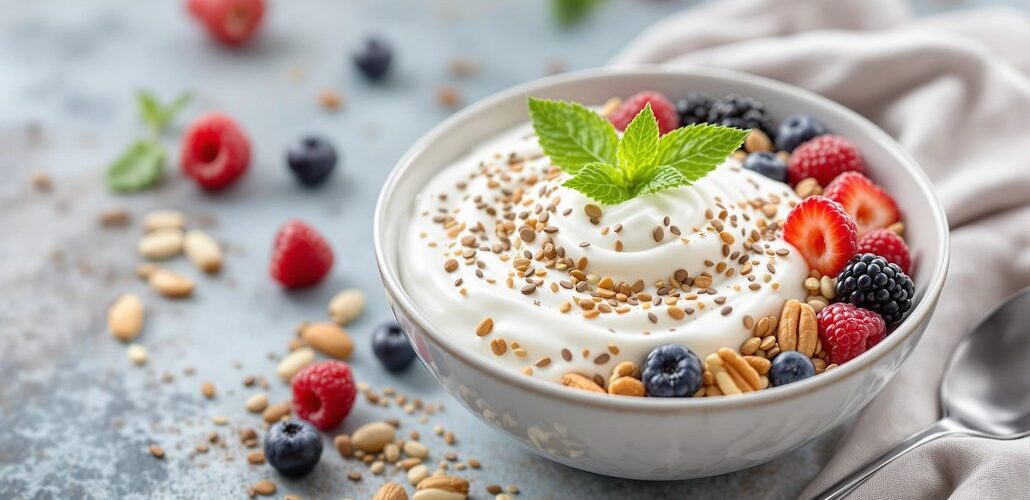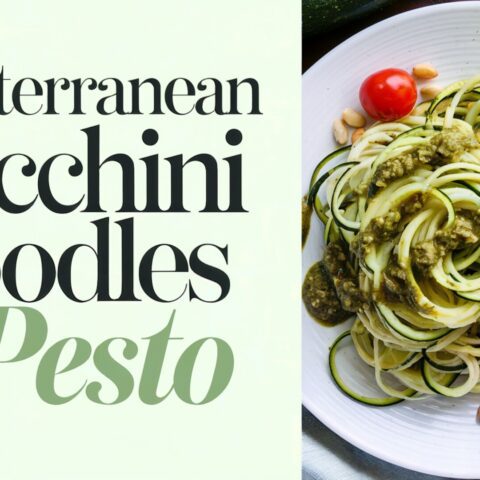
Ratio Yogurt is a nutrient-dense dairy option, particularly attractive for its high protein content of 25 grams per serving and low sugar levels, making it suitable for ketogenic and high-protein diets. It uses ultra-filtered milk to enhance protein while minimizing carbohydrates. However, its use of artificial sweeteners like sucralose and additives such as carrageenan may concern health-conscious consumers. Despite its benefits for muscle recovery and blood glucose stability, it is classified as a processed food, which might not appeal to everyone. Exploring various aspects can provide a thorough view of its health implications and alternatives.
Key Takeaways
- Ratio Yogurt provides 25 grams of protein per serving, supporting muscle recovery and growth.
- It is low in sugar and carbohydrates, making it suitable for ketogenic and diabetic diets.
- Sweetened with erythritol and sucralose, it avoids high caloric content, though some may avoid artificial sweeteners.
- Contains carrageenan, an additive with debated health implications, raising concerns for some consumers.
- Lacks probiotics found in traditional yogurts, potentially missing digestive health benefits.
Understanding Ratio Yogurt
Diving into the details of Ratio yogurt reveals its unique positioning as a high-protein dairy snack designed to meet specific nutritional demands. Remarkably, Ratio boasts an impressive 25 grams of protein per 5 oz serving, substantially surpassing the protein content found in traditional Greek yogurt. This high protein content is achieved through the use of ultra-filtered milk, a process that concentrates protein and simultaneously reduces sugar levels, offering a creamy texture that appeals to consumers prioritizing nutrient density.
Ratio yogurt also incorporates yogurt cultures such as L. bulgaricus and S. thermophilus, which are known to support digestive health. These cultures can promote a balanced gut microbiota, potentially enhancing overall gastrointestinal function.
However, it is essential to recognize that despite its health-focused formulation, Ratio yogurt is still classified as a processed food. This classification implies that it may contain additives like carrageenan, which some individuals might prefer to avoid due to potential digestive concerns.
The product's tailored nutritional profile—characterized by low sugar and high protein content—aligns well with dietary regimens such as ketogenic or high-protein diets. This design underscores Ratio's commitment to catering to consumers with specific dietary needs, offering a balanced approach to functional snacking.
Nutritional Breakdown
When evaluating the nutritional profile of Ratio Yogurt, its protein content stands out at 25 grams per 5 oz serving, surpassing the typical 11-16 grams found in Greek yogurts, positioning it as a high-protein choice.
This yogurt also contains only 8 grams of carbohydrates per serving, aided by the use of ultra-filtered milk and whey protein concentrate, which effectively reduces sugar content.
However, the inclusion of sucralose as a sweetener may be a consideration for those avoiding artificial additives, necessitating a balanced assessment of its nutritional advantages and potential concerns.
Protein Content Comparison
One compelling aspect of Ratio yogurt lies in its impressive protein content, which stands at 25 grams per serving. This high protein content is a key differentiator when compared to typical Greek yogurts, which generally offer between 11 to 16 grams of protein per serving.
The protein in Ratio yogurt is derived from ultra-filtered milk and whey protein concentrate, both of which contribute to its enhanced nutritional profile. The inclusion of whey protein concentrate is particularly beneficial as it is known for supporting muscle recovery and growth, making Ratio yogurt a suitable option for fitness enthusiasts.
The caloric and macronutrient composition of Ratio yogurt further accentuates its appeal:
- Calories: Each serving contains 170 calories, which is moderately low and makes it a viable choice for those monitoring caloric intake.
- Carbohydrates: With only 8 grams of carbohydrates, it fits well into low-carb diet plans.
- Fats: The yogurt contains 4 grams of fat, maintaining a balanced fat profile.
The high protein content allows Ratio yogurt to serve not only as a nutritious snack but also as a potential meal replacement, catering to individuals seeking to boost their daily protein intake efficiently and effectively.
Sugar and Carbohydrates
Ratio yogurt stands out in the nutritional landscape due to its exceptionally low sugar and carbohydrate content. With only 3 grams of total carbohydrates per serving, it is a favorable choice for individuals managing their carbohydrate consumption. This minimal carbohydrate presence is a critical factor for those adhering to low-carb or ketogenic diets, where monitoring carb intake is essential for maintaining metabolic ketosis and energy balance.
The sugar content in Ratio yogurt is limited to just 1 gram per serving. This low sugar profile is beneficial for maintaining stable blood glucose levels, an important aspect for individuals with diabetes or those seeking to reduce sugar intake for other health reasons. The product achieves this sweetness through the use of sugar alcohols, specifically erythritol, and sucralose. These sugar alcohols provide sweetness without significant caloric contribution, assisting in the product's low-calorie benefit.
Moreover, the high protein content of 25 grams per serving further distinguishes Ratio yogurt, offering a significant advantage over traditional Greek yogurts. The combination of low sugar and carbohydrate content, sweetened by sugar alcohols, positions Ratio yogurt as a viable option for health-conscious consumers prioritizing a balanced macronutrient profile.
Protein Content Analysis
The protein content of Ratio yogurt is remarkably robust, featuring an impressive 25 grams per 5 oz serving. This protein content analysis reveals that Ratio yogurt surpasses typical Greek yogurt, which generally offers between 11 to 16 grams of protein.
The enhanced protein levels in Ratio yogurt are achieved through the incorporation of ultra-filtered milk and whey protein concentrate, ensuring a complete protein profile that is advantageous for muscle maintenance and recovery.
It's important to distribute protein intake evenly across meals, ideally consuming 15-25 grams of protein per meal, to optimize muscle synthesis and maintain ketosis. Additionally, the yogurt maintains a low carbohydrate profile, with only 3 grams of net carbs. This makes it an attractive option for those mindful of their carbohydrate intake.
- Superior Protein Source: Ratio yogurt's protein content is not only higher but also derived from quality sources, providing essential amino acids needed for various bodily functions.
- Satiety and Weight Management: The substantial protein content supports prolonged satiety, which can be instrumental for individuals aiming to manage their weight effectively.
- Low Sugar Alternative: With just 1 gram of sugar alcohols, Ratio yogurt offers a viable option for those seeking to minimize sugar consumption while enjoying a high-protein snack.
Flavor and Variety
Variety in flavor selection can play an essential role in consumer satisfaction and dietary adherence, and Ratio yogurt offers a diverse array of options to cater to different taste preferences. With flavors such as Vanilla, Coconut, Blueberry, Strawberry, and Key Lime, Ratio yogurt aims to appeal to a wide range of palates, thereby enhancing the likelihood of regular consumption.
This variety is vital for individuals who may become easily bored with monotonous dietary options, allowing them to integrate high-protein choices into their diet without sacrificing enjoyment.
Beyond its flavor offerings, Ratio yogurt is marketed as a "dairy snack," which distinguishes it from traditional yogurt and adds a layer of convenience for consumers on-the-go. This differentiation not only broadens its appeal but also aligns with modern dietary trends where convenience meets nutritional needs.
The Vanilla variant is available in multi-serving containers, providing flexibility for those who prefer bulk purchasing for meal prep or sharing.
However, the sweetness level across flavors has been a point of contention, with some consumers finding it overly sweet. This aspect may influence individual perceptions of taste quality and could potentially impact consumer choice despite the nutritional advantages offered by its 25 grams of protein per serving.
Pros of Ratio Yogurt
With its substantial protein content of 25 grams per serving, Ratio Yogurt stands out as an excellent choice for individuals focused on muscle maintenance and recovery. The inclusion of whey protein is particularly beneficial for those seeking to enhance their dietary protein intake, as it is a high-quality, fast-digesting protein known to support muscle repair and growth.
Additionally, the yogurt is crafted using ultra-filtered milk, which not only boosts the protein concentration but also reduces sugar and lactose levels, making it a viable option for those looking to minimize sugar consumption. This aligns well with dietary plans like the ketogenic diet, which emphasizes low carbohydrate intake and can naturally reduce sugar cravings.
There are several notable advantages of incorporating Ratio Yogurt into a balanced diet:
- High Protein Content: With protein levels surpassing typical Greek yogurt, Ratio Yogurt offers a potent source of whey protein.
- Dietary Flexibility: The availability of various flavors and low-sugar options caters to diverse taste preferences and dietary needs.
- Convenience: Its portable packaging provides a nutritious, on-the-go snack, perfectly aligning with hectic lifestyles.
Moreover, Ratio Yogurt is gluten-free, expanding its accessibility to those with gluten sensitivities. This multifaceted approach to nutrition makes Ratio Yogurt a compelling choice for health-conscious individuals seeking both convenience and nutritional benefits.
Cons and Considerations
Despite the notable benefits associated with Ratio Yogurt, it is important to examine some potential drawbacks and considerations for consumers. While this dairy snack is lauded for its high protein content, offering 25 grams per serving, it lacks the probiotic benefits typically found in yogurts containing live cultures. This absence may be a disadvantage for those who consume yogurt for its gut health advantages.
Moreover, Ratio Yogurt incorporates sucralose as a sweetener, which may not align with the preferences of individuals avoiding artificial sweeteners due to potential health concerns. This choice of sweetener has led to some mixed reviews, with consumers noting an overly sweet taste that may not satisfy every palate.
Cost is another consideration, as Ratio Yogurt tends to be priced higher than traditional yogurt options, at $1.69 per single serving and $1.37 for a 24 oz container. This price point may deter budget-conscious shoppers from regularly purchasing this dairy snack.
Additionally, its limited availability in physical stores could pose a challenge for consumers seeking the convenience of local purchasing options. These factors collectively warrant thoughtful consideration when evaluating Ratio Yogurt as a healthy dietary choice.
Sweeteners Used
Ratio yogurt incorporates erythritol and sucralose as sweeteners, which offer a low-calorie alternative to traditional sugars while preserving the product's palatability.
Erythritol, a sugar alcohol, contributes minimally to caloric intake and carbohydrate absorption, whereas sucralose provides sweetness without affecting the gut microbiome.
These sweeteners, used judiciously, support the yogurt's low sugar content and high protein profile, making it a viable option for individuals conscious of their sugar consumption and overall health.
Erythritol and Sucralose Impact
The use of erythritol and sucralose as sweeteners in Ratio Yogurt offers several health benefits due to their distinct properties. Erythritol, contributing only 0.2 kcal per gram, positions itself as a low-calorie option beneficial for calorie-conscious consumers.
Sucralose is recognized for not disrupting the gut microbiome, which is advantageous for digestive health. The erythritol and sucralose impact results in a balanced approach to sweetness without the high sugar content, with only 1g of sugar per serving in Ratio Yogurt.
From an evidence-based perspective, the benefits of these sweeteners can be summarized as follows:
- Caloric Reduction: Erythritol offers a low-calorie alternative to traditional sugars, aiding in caloric control and weight management without sacrificing sweetness.
- Carbohydrate Absorption: Erythritol's lower carbohydrate absorption minimizes the gastrointestinal discomfort often associated with sugar alcohols, making it a digestive-friendly option.
- Blood Glucose Stability: The minimal presence of sweeteners in Ratio Yogurt helps maintain stable blood glucose levels, essential for individuals monitoring their sugar intake.
Sweeteners and Gut Health
Examining the interplay between sweeteners and gut health reveals that erythritol and sucralose, used in Ratio Yogurt, offer a promising balance of taste and digestive benefits.
Erythritol, a sugar alcohol with a caloric value of just 0.2 kcal/g, is a low-calorie alternative to traditional sugars. Its minimal impact on blood glucose levels makes it particularly appealing for individuals managing their sugar intake. In addition, erythritol is generally well-tolerated by the digestive system and unlikely to cause significant gastrointestinal distress when consumed in moderation.
Sucralose, another sweetener in Ratio Yogurt, is notable for its lack of disruption to the gut microbiome. Maintaining a healthy gut microbiota is essential for overall digestive health, and sucralose's neutrality in this regard supports its suitability for inclusion in a balanced diet.
The sparing use of these sweeteners in Ratio Yogurt aligns with dietary recommendations to limit sweetener intake, akin to sugar consumption in general diets.
Market Position and Trends
Positioned firmly within the high-protein dairy alternative market, Ratio yogurt capitalizes on the increasing consumer demand for nutrient-dense food options. With an impressive 25 grams of protein per serving, Ratio yogurt greatly surpasses traditional Greek yogurts, which typically offer 11-16 grams of protein. This high-protein content makes it an attractive choice for fitness enthusiasts and individuals focused on maintaining a protein-rich diet without sacrificing convenience.
The market trends reveal several key points regarding Ratio yogurt's strategic position:
- Growing Health-Conscious Consumer Base: The brand taps into the expanding trend of consumers seeking health-oriented products, aligning with personal nutritional goals.
- Competitive Edge: With a GGR score of 4.5/5, Ratio yogurt enjoys favorable consumer feedback, particularly highlighting its protein content, thereby positioning itself as a formidable competitor in the yogurt segment.
- Challenges in Availability: Despite its strengths, Ratio yogurt faces hurdles regarding limited availability in physical stores and mixed reviews on taste, particularly sweetness levels.
Reflecting broader dietary trends, Ratio yogurt underscores a shift towards high-protein alternatives, driven by the increasing desire for personalized, nutrition-focused food choices.
Such positioning allows Ratio yogurt to address evolving consumer preferences effectively.
Carrageenan Concerns
As consumers increasingly prioritize health-oriented choices, the ingredients within these products come under greater scrutiny. One ingredient garnering attention is carrageenan, an additive found in some processed foods, including Ratio Yogurt.
Carrageenan concerns primarily stem from animal studies indicating potential carcinogenic effects. Despite these findings, human data remains limited, making it challenging to draw definitive conclusions about its safety in food products.
In the context of human consumption, studies suggest that high levels of carrageenan intake, especially within ultra-processed foods, could be harmful. These studies fuel ongoing debates among experts, some of whom argue that the evidence linking carrageenan to adverse health outcomes is insufficient.
This division underscores the complexity of evaluating food additives and their long-term impacts on health. Case-control studies have yielded mixed results, further emphasizing the need for thorough research to clarify carrageenan's health implications.
The discourse surrounding carrageenan's safety highlights a broader issue—the importance of diet quality. While individual ingredients like carrageenan are scrutinized, it is essential to reflect on the overall dietary patterns and the potential risks associated with high consumption of ultra-processed foods.
This balanced perspective is necessary for informed dietary choices.
Healthier Alternatives
When considering healthier alternatives to Ratio Yogurt, whole food options such as nuts, seeds, and legumes offer protein-rich nutrition devoid of added sugars and artificial sweeteners.
Additionally, non-dairy substitutes like almond or coconut milk yogurt provide lactose-intolerant individuals with viable plant-based options, expanding dietary variety.
Whole Food Options
In the quest for healthier dietary options, whole food sources stand as a compelling alternative to processed yogurt products. Whole food sources of protein, such as nuts, seeds, and legumes, deliver natural nutrients without the additives and sweeteners often found in commercial yogurt varieties.
Opting for these sources guarantees a diet rich in essential amino acids and healthy fats, which are crucial for maintaining muscle health and supporting metabolic functions.
- Nuts and Seeds: Almonds, chia seeds, and flaxseeds are excellent sources of protein and healthy fats. These can be easily incorporated into meals or snacks, providing a nutrient-dense boost.
- Legumes: Incorporating legumes like lentils and chickpeas into your diet can offer substantial protein and fiber content, promoting satiety and digestive health.
- Homemade Yogurt: Creating yogurt at home using milk and active cultures allows for control over sugar and additive content, guaranteeing a wholesome product that can support gut health with probiotics.
Exploring these alternatives promotes a balanced nutritional profile, encouraging the intake of diverse nutrients.
Additionally, opting for Greek yogurt made from whole milk can provide high protein content and probiotic benefits, steering clear of artificial sweeteners prevalent in some processed yogurt options.
Non-Dairy Substitutes
Non-dairy yogurt substitutes present a viable alternative for those seeking to avoid lactose or dairy products due to allergies or intolerances. Options such as almond, coconut, and soy-based yogurts provide lactose-free solutions while also catering to vegan dietary preferences. These non-dairy yogurt alternatives are often fortified with essential vitamins and minerals, including calcium and vitamin D, to replicate the nutritional benefits of traditional dairy yogurt.
However, one limitation is their typically lower protein content compared to high-protein yogurts like Ratio Yogurt. This necessitates supplementing them with other protein-rich foods to maintain a balanced diet. Despite this, many non-dairy yogurts incorporate natural sweeteners and probiotics, mirroring the gut health benefits of dairy counterparts and avoiding artificial additives like sucralose, which is present in some dairy yogurts.
Additionally, homemade non-dairy yogurts offer an opportunity to utilize whole food ingredients, providing control over additives and sweeteners. This can lead to a cleaner, more tailored dietary option.
Frequently Asked Questions
Are Ratio Protein Yogurts Healthy?
Ratio Protein Yogurts, with their high protein content of 25 grams per serving, offer a nutritious option for those prioritizing protein intake. However, potential concerns include artificial sweeteners like sucralose, which may not align with all dietary preferences.
Is Ratio Real Yogurt?
Ratio's classification as yogurt is debated due to differing ingredient quality, with added fats and ultra-filtered milk altering its formulation. Although it includes standard yogurt cultures, its deviation from traditional recipes questions its authenticity as true yogurt.
How Much Sugar Does Ratio Yogurt Have?
Ratio Yogurt has a sugar content of 3 grams per serving. This low-sugar profile, achieved through natural sweeteners, aligns with a nutrient-focused approach, supporting individuals seeking to manage sugar intake without compromising protein intake.
Is Double Cream Plain Yogurt Healthy?
Double cream plain yogurt offers creamy benefits with its rich nutrient profile, providing substantial protein and probiotics. While higher in fat, it supports satiety and gut health, making it a balanced choice when consumed in moderation within dietary needs.
Conclusion
Ratio yogurt presents a nutrient-dense option with high protein content and diverse flavors, appealing to health-conscious consumers. The inclusion of sweeteners and carrageenan may raise concerns for some, yet the overall nutritional profile remains favorable. Market trends indicate a growing demand for such products, though awareness of potential additives is advised. When considering healthier alternatives, evaluating individual dietary needs and preferences is essential. Overall, ratio yogurt can contribute positively to a balanced diet when consumed mindfully.










No Comments